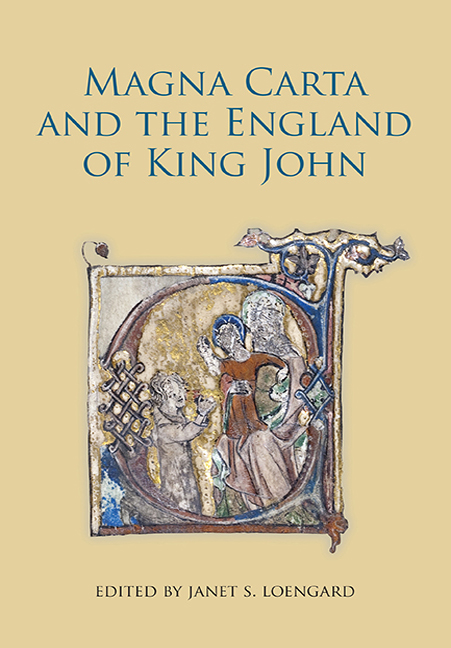Book contents
- Frontmatter
- Contents
- List of Contributors
- List of Abbreviations
- Introduction
- England in 1215: An Authoritarian Angevin Dynasty Facing Multiple Threats
- The Anonymous of Béthune, King John and Magna Carta
- Baronial Paranoia in King John's Reign
- The Forest Eyre in the Reign of King John
- The Managerial Revolution in the English Church
- Magna Carta, the ius commune, and English Common Law
- Justice without Judgment: Criminal Prosecution before Magna Carta
- What Did Magna Carta Mean to Widows?
- The English Economy in the Age of Magna Carta
- The Complaint of King John against William de Briouze (c. September 1210)
- Index
What Did Magna Carta Mean to Widows?
Published online by Cambridge University Press: 28 April 2017
- Frontmatter
- Contents
- List of Contributors
- List of Abbreviations
- Introduction
- England in 1215: An Authoritarian Angevin Dynasty Facing Multiple Threats
- The Anonymous of Béthune, King John and Magna Carta
- Baronial Paranoia in King John's Reign
- The Forest Eyre in the Reign of King John
- The Managerial Revolution in the English Church
- Magna Carta, the ius commune, and English Common Law
- Justice without Judgment: Criminal Prosecution before Magna Carta
- What Did Magna Carta Mean to Widows?
- The English Economy in the Age of Magna Carta
- The Complaint of King John against William de Briouze (c. September 1210)
- Index
Summary
The men who put together Magna Carta were concerned, among other things, about their wives and sisters and daughters and other female relatives who would, by a husband or father's death, be made heiresses or widows. Widows – the subject of this essay – appear in clauses 7, 8, and 11 of the 1215 Charter, and in clause 7 of the 1225 version, in the context of their remarriage, maritagium, inheritance, and dower. All those provisions were intended for their protection. As the result, for several generations the reaction to Henry II and his sons moved beyond merely curtailing abuses to creating a climate favourable to women who had lost their husbands. Paul Brand has argued that, by the end of the thirteenth century, attitudes had shifted to make dower, at least, less an automatic entitlement to a valid marriage; in any event, it is certain that in the following century dower became less secure. But that has nothing to do with the world of King John and Magna Carta. The intent here is to discuss the background to the Charter provisions and analyse their practical effects.
The drafters of Magna Carta had reason for their concern. Widows in England had long been the subject of royal intervention. Perhaps it is because they were vulnerable and needed protection – they are classed as personae miserabilis, persons to be cared for, at canon law – or perhaps it is because they were potentially disruptors of the orderly transmission of property from generation to generation, or because there was uneasiness about a grown woman free to some extent to make her own marital choices.
Henry I's coronation charter promised that a childless surviving wife should have her dower and maritagium and that she would not be given in marriage except according to her will. If she had children, she would have dower and maritagium so long as she ‘kept her body honestly’ and again there was the provision on remarriage. Henry's barons were told ‘likewise to restrain themselves towards the sons and daughters and wives of their men’. But Henry did not restrain himself; the only pipe roll remaining from his reign shows women making payments for dower and/or maritagium and fining not to take a husband. As women in his gift, they had no choice but to bargain with him.
- Type
- Chapter
- Information
- Magna Carta and the England of King John , pp. 134 - 150Publisher: Boydell & BrewerPrint publication year: 2010



